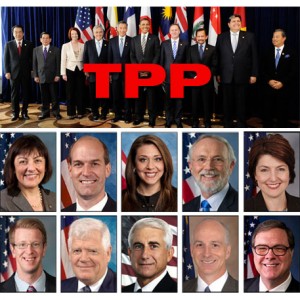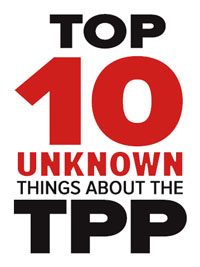NATIONAL
The top 10 unknown things about the TPP deal
 (Oct. 12, 2015) — Trade ministers for the 12 Pacific Rim nations who have been negotiating the massive Trans-Pacific Partnership (TPP) say they have reached an agreement. But nobody — not the public, not even Congress — has been allowed to read the secretive deal as it continues to get an international “legal scrubbing” to make sure the language matches what was agreed to by handshake.
(Oct. 12, 2015) — Trade ministers for the 12 Pacific Rim nations who have been negotiating the massive Trans-Pacific Partnership (TPP) say they have reached an agreement. But nobody — not the public, not even Congress — has been allowed to read the secretive deal as it continues to get an international “legal scrubbing” to make sure the language matches what was agreed to by handshake.
Some TPP draft language leaked over the past few months and years, enough that many are already opposing the deal because, similar to other “free trade” agreements like NAFTA, it promises to degrade international labor and environmental standards while elevating the rights of corporations above people and governments.
But the truth is, nobody knows for sure, yet. We haven’t been allowed to see it.
That hasn’t stopped “free trade” cheerleaders from beginning the drumbeat of public pressure to urge its swift passage. From President Obama to corporate lobbying groups to newspaper editorial boards (see The Oregonian and The News Tribune last week), Congress is already being urged to resist “protectionists,” to give the TPP “the benefit of the doubt,” and support its passage.
Ummm… Is it OK if we read it first?
 The AFL-CIO has compiled a great list of 10 unanswered questions about the TPP. (Here it is in printable PDF format.)
The AFL-CIO has compiled a great list of 10 unanswered questions about the TPP. (Here it is in printable PDF format.)
1. How will the TPP raise American wages? While there certainly are some U.S. companies that will benefit from the TPP, how will the TPP restore the connection between increased productivity and increased wages? By encouraging and rewarding more outsourcing of jobs, it is likely to put downward pressure on U.S. wages, as prior FTAs have done.
2. How will the TPP ensure labor obligations actually are enforced? Will it require an administration to self-initiate a case when another party’s labor rights violations are well known? Will countries like Vietnam and Malaysia be in compliance with the labor standards on day one? Existing trade deals allow too much discretion to delay labor rights complaints or ignore them altogether. From what is publicly known about the TPP, these and other critical labor issues remain completely unaddressed.
3. How will the TPP fix our trade balance or create jobs when it contains no mechanism to control currency manipulation? Addressing currency manipulation is probably the single most effective way the United States can create jobs, as it allows U.S. products to compete on fair terms in the global marketplace. The promised TPP tariff benefits could be undermined overnight if trading partners devalue their currency. Despite urging from Congress, all reports indicate no effective currency disciplines are included in the TPP.
4. What mechanism will ensure a level playing field between foreign investors and American small businesses and their workers? Foreign investors will have access to a private justice system — investor-state dispute settlement (ISDS) — that allows them to bypass American courts and hold for ransom laws and regulations they think will interfere with their profits. This right creates an enormous influence that local businesses and workers simply won’t have. The administration is characterizing the Trans-Pacific Partnership (TPP) as the “most progressive trade agreement ever.” Unfortunately, the administration has indicated it will remain classified to the public for some time.
5. Will the TPP ensure all parties adopt climate measures at least as strong as those the United States implements — or allow for offsetting fees at the border? If it fails to do this, then the TPP will exacerbate incentives to move production outside the United States to escape carbon reduction efforts.
6. How will the TPP adequately protect local and national control over public services? If important public services, including schools, libraries, the Post Office and water systems aren’t completely carved out of the TPP’s obligations, American taxpayers may be stuck having to pay a ransom to wrest back democratic control over expensive, low-quality, private contractors.
7. Will the TPP adequately protect against unfair competition by state-owned and state-subsidized companies? Such companies often operate at a loss simply to drive U.S. competitors out of business. They also may buy U.S. companies in order to take technology to their home country, leaving U.S. workers holding the bag. It’s not clear how small U.S. businesses will be able to use the TPP to fight back.
8. Will the TPP ensure the United States “writes the rules” of trade? For example, the reported weak rule of origin for automobiles ensures that China and other non-TPP countries will be able to benefit from the TPP without ever joining. That means China still can write its own rules. Americans need to know “who” is the “we” writing the rules, because it doesn’t appear to be working people.
9. How will the TPP “help Americans buy American”? The TPP will require many government purchasing decisions to treat bidders from the 11 TPP countries with exactly the same preferences as U.S. bidders. Won’t this actually reduce the likelihood that Americans can use their own tax money to create jobs here in the United States?
10. Will the TPP make medicines more expensive? Will the drug pricing provisions give foreign pharmaceutical companies more leverage to force Medicare to cover their products and pay higher prices for them?





